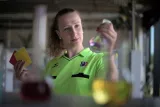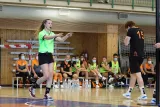Published: 04.01.2023
When she's not running around the court, she wears a white coat and locks herself in the lab. Denisa Kolářová, a PhD student at the Faculty of Chemical Technology, is not only a scientist in Professor Holčapek's successful team, but also a Czech national team player, coach and referee in korfball.
Korfball is not a very common sport. How would you describe it?
Korfball is the only ball game that girls and boys play together. There must be four girls and four boys on each team. The game is very similar to basketball, except we can't run with the ball or dribble it. And we also play behind the basket. Indeed, it's not a well-known sport, but it's gender-balanced. That's become a big issue recently, and korfball is leading the way. Maybe this will help make it more famous.
Do you ever get worried that you are playing a contact sport, also against men?
Of course, we might hit one another, which is not the aim. But there's nothing to worry about, as another rule of korfball is that a girl can only be defended by a girl, whereas boys guard boys. So, the risk of a collision with a man is not so great.
What is the aim?
The aim is to hit the opponent's basket, which is located two-thirds of the distance between the centre line and the back of their half. At the same time, defence and offence always alternate after every two points, so each player must be able to play both. I must be good at attacking and defending, which is what I love about korfball.
What does a player need to know?
In korfball, it's all about running and accuracy. One has to be a good shot to score baskets, which isn't always easy since the basket is half a metre higher than in basketball. Of course, we also practise technique. In short, one has to be skilled and physically fit. But one nice thing about korfball is that you don't need anything, no rackets or hockey sticks, just sports shoes.
When and why was korfball born?
It was invented in 1902 by a Dutch teacher who racked his brains over the fact that there were mixed physical education classes in the first years of primary school and no sport to be enjoyed by everyone. When football or basketball was played, boys always enjoyed the game more. So he invented korfball, where girls and boys had the same opportunities and everyone could play and enjoy it.
When did you first play the game?
When I was in my first year of school, the head teacher, who coached korfball, came to my mom saying she needed girls for the team. So, I started playing, but back then, I was still too young to fully understand it. It wasn't until the third year of school that I realised I was really into it. And now, I'm in my 19th year of playing korfball. What I've always liked about it is that the team is mixed. I think it has given me a lot in life and taught me how to get along with both genders and interact with both my female friends and the guys.
How does a girl who plays korfball in the first year of school become a Czech national player?
It was very soon that we started going to matches, and since the sport is not so widespread, we were still kids when we played in Děčín, České Budějovice, Brno – in short, all over the Czech Republic. I started to notice I was getting better, and when I was 12, I was invited to the national under-16 team. We went to a tournament in the Netherlands, which started my career. When I was 14, I was named the best player in the world in U16, and a year later, it happened again. By then, I had already begun playing in U19 and was named the world's best player in that category the following year. At 16, I went to the World Games in Colombia. My biggest achievement was qualifying with the U21 national team for the U23 World Championship. It was played in Olomouc, so at home, which resulted in a great atmosphere and a bronze medal for our team. But since then, I haven't played actively: I've had two operations on my knee, and I'm waiting for the next one. Unfortunately, all that success took a toll on my body.
So, the sport allowed you to travel the world…
Thanks to korfball, I've been to Colombia, South Africa, Portugal, Germany and to the Netherlands several times. I would go there up to six times a year as we had our camps and tournaments there.
But you don't just play korfball…
It's true that I also train children and adults, and I'm a referee too. I told myself I wanted to know the rules properly and fill various roles in the game. As a player, it's easy to criticise the referee, but I wanted to know the other perspective. One realises that we're all only human. We're not robots, and we make mistakes. Just as a player can make one, so can the referee. I found that I enjoy refereeing korfball and it helps me sort out many things in my head. I love being able to express my emotions and feelings on the court. I usually try to do it politely, but sometimes can't control myself. Since I've been refereeing, I've calmed down and become more understanding. And now I'm an international referee.
You are a (female) referee in a sport where men also play. Are there any conflicts because of that?
Sometimes things come up. Some men can't help showing that no woman will ever order them around. But I'm tough, so I never tolerate that. I need to show that I'm the ref, the decider, and my decisions are final. Fortunately, I'm pretty good at it. Maybe it helps that I'm quite tall! And my best defence is to smile. So I don't argue or get into conflict with them, which puts many people off, and the problem's over.
On top of that, you are also training kids.
Being a coach is complicated for my personality. I like to express my emotions on the court, and when you're a part of a team, you want to advise the players. But as a coach, you have to stand on the sidelines and can't enter the court, which is always hard for me (laughs). I've always wanted to do everything and wanted to be the best. I wanted to be the best player, coach and referee, but you can't do everything 100 percent. So, when I got injured and my career was over, I focused on refereeing and teaching kids. I want to give them everything I've learned.
How much time do you spend on the sport?
A lot, actually. As long as I don't have a family of my own, I'm fine, but even so, I often deal with a lot of time pressure. I try to manage everything, and sometimes I do and sometimes I don't, but that's just the way it is. Sometimes, I wish I could fly from the lab to korfball and back again.
You have already mentioned that besides sports, you are also successful in research and, on top of that, are in Prof. Holčapek's excellent team.
That is what I'm truly proud of. That's why I don't want to make everything just about sport. I want to put a lot of energy into science and research since I know I can get far in science under Prof. Holčapek's guidance. In addition, I'm very grateful to him as he was the one who chose me. After one exam, he told me he could see some potential in me and asked if I wanted to write my thesis with him. It was now or never, I told myself. It was a new incentive which brought me a lot of opportunities. One of the side benefits was improving my English, which I had neglected a bit in high school. There are many foreigners in our research team that I wouldn't understand otherwise.
You also won Rector's Award for your thesis. What did you focus on?
I worked on sphingolipid analysis. In our team, we focus on the research of cancer detection, and it's been shown recently that this class of lipids is a biomarker in cancer and that there are some dysregulations in them. That's why I focused on sphingolipids, used mass spectrometry and optimised a new method. I must say I greatly enjoyed the work, and even entered it in two competitions. The first one wasn't a success, but I won the Siemens Prize. Although the company focuses more on electronics, they got interested in the topic. I'm glad they rewarded analytical chemistry because early-stage cancer detection is vital.
Prof. Holčapek and his team were rewarded for detecting pancreatic cancer at an early stage, even from a single drop of blood…
That's what makes it so unique. Nowadays, we do various biopsies, blood tests and similar invasive methods that are often painful. We know that lipids play a significant role in cancer, and analysing them is not that easy, but the result is incredible.
How can this momentous discovery move forward?
The method of detecting pancreatic cancer from a drop of blood has been patented, but there's still a long way to go. The whole process has taken seven years, and the method must still pass through the clinical testing phase. Samples will have to be taken, and there will be not hundreds of them, but thousands. And those thousands will have to show that it works. Of course, the goal is for doctors to accept the method, trust the results, and send their patients for such testing. If a future clinical trial goes well, it'll be a revolution.
Do chemistry and korfball have anything in common?
Teamwork. I insist that in both korfball and chemistry, you need a team around you. It's always better with more people around, and when I know there's somebody behind me as support, everything is a lot easier. Having a team in both korfball and science keeps me on track. Both teams are my drive to get things done.



